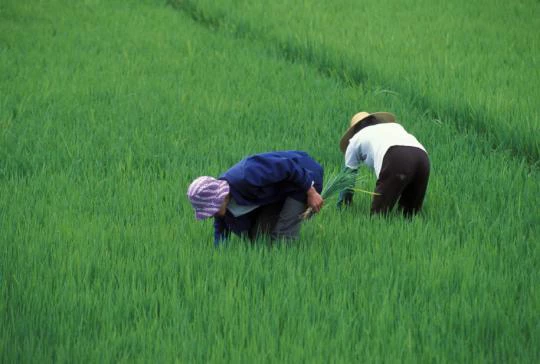Where was the lettuce in your salad grown? How was it cultivated, sourced, packaged and distributed? How many suppliers were involved and who are they? How much energy and water did it take from growing it in the farm to serving it on your table?
These questions might not be the typical things you would contemplate when eating a salad, but rapid urbanization and changes in climate, agricultural, and food production patterns are raising a host of alarming questions for many. How is the world going to sustainably feed more than 9 billion people by 2050, when farm lands are being converted into industrial and commercial use, and extreme weather events are jeopardizing our future resources?

This is a more daunting problem for China, where under-investment in the food industry and environmental pollution have aggravated the situation. A recent official Chinese government report issued by the Ministry of Environmental Protection and Ministry of Land and Resources shows that more than 16% of China’s soil and 19.4% of farm land is polluted, according to the state news agency Xinhua.
The good news is some large food retailers have started responding to the problem by establishing rigorous food safety programs to improve transparency and traceability in their supply chains. For instance, the Chinese branch of the German food wholesaler Metro Cash and Carry is implementing a farm-to-market food traceability program among its 4000 suppliers to ensure that every single step in the sourcing process is identifiable and traceable. Supply chain traceability programs are one of many open and collaborative initiatives private sector players are leading to instill more stringent environmental, social, and governance (ESG) practices into global economic activities.
Why Transparency and Collaboration?
Since China currently has no explicit regulatory framework enforcing private sector ESG actions, Chinese companies practicing responsible and ethical business largely act out of competitiveness needs, as opposed to compliance pressure. I learned some inspiring examples in a recent conference on responsible sourcing and supply chain sustainability management held in Shanghai last month.
For example, China’s information communications technology giant Huawei integrates stringent governance assessment into its global supplier management and procurement systems by conducting risk assessments for new suppliers. For small and medium enterprises (SMEs) in the clothing and accessories industry like Ningbo Sureway Bags and Show-in Group, going beyond basic labor standards to provide better working conditions for their workers brings not only employee loyalty, but also increases capacity and resources that propel rapid business expansion.
How to Capitalize on the Value of Transparency and Collaboration
Transparency and collaboration are two essential elements that can be capitalized to enhance procurement efficiency, reduce overall business cost and generate economic benefits. More often than not, suppliers at various levels are shared among companies in the same business line; thus, different companies may check on the same supplier multiple times using various ESG indicators. These repetitive audits can be a huge waste of resources and drive up embedded production costs. Recognizing the benefits of being open and collaborative, more and more companies are not only reporting on their ESG performance as part of the conventional corporate social responsibility approach, but are also creating collaboration portals to share information to unlock economic value along supply chains.
A Level Playing Field for Responsible Businesses
The World Bank, in collaboration with Sedex Global, and other supply chain aggregators like Ecodesk, are building an Open Supply Chain Platform, an open-data instrument of the Open Private Sector Platform, which will enable any company worldwide, large or small, to openly upload, track, and share basic ESG information using a series of indicators such as labor conditions, health and safety measures, environmental matters, business ethics, and third-party certifications. Another World Bank Group member, the International Financial Corporation (IFC), is also actively engaged in food safety traceability programs and has piloted innovative mechanisms like the Global Trade Supplier Finance and Inclusive Business program, which provide financing and advisory support to small- and medium-sized suppliers that excel at ESG practices.
More than 80% of Chinese farmers- who are feeding 1.4 billion Chinese population and millions more abroad- are unorganized and do not have direct access to the retail market. Programs like the Open Supply Chain Platform would help elevate visibility for farmers and SME suppliers who sit at the very bottom of the supply chain, and increase opportunities for those that practice ethical, sustainable and responsible business.
These questions might not be the typical things you would contemplate when eating a salad, but rapid urbanization and changes in climate, agricultural, and food production patterns are raising a host of alarming questions for many. How is the world going to sustainably feed more than 9 billion people by 2050, when farm lands are being converted into industrial and commercial use, and extreme weather events are jeopardizing our future resources?

This is a more daunting problem for China, where under-investment in the food industry and environmental pollution have aggravated the situation. A recent official Chinese government report issued by the Ministry of Environmental Protection and Ministry of Land and Resources shows that more than 16% of China’s soil and 19.4% of farm land is polluted, according to the state news agency Xinhua.
The good news is some large food retailers have started responding to the problem by establishing rigorous food safety programs to improve transparency and traceability in their supply chains. For instance, the Chinese branch of the German food wholesaler Metro Cash and Carry is implementing a farm-to-market food traceability program among its 4000 suppliers to ensure that every single step in the sourcing process is identifiable and traceable. Supply chain traceability programs are one of many open and collaborative initiatives private sector players are leading to instill more stringent environmental, social, and governance (ESG) practices into global economic activities.
Why Transparency and Collaboration?
Since China currently has no explicit regulatory framework enforcing private sector ESG actions, Chinese companies practicing responsible and ethical business largely act out of competitiveness needs, as opposed to compliance pressure. I learned some inspiring examples in a recent conference on responsible sourcing and supply chain sustainability management held in Shanghai last month.
For example, China’s information communications technology giant Huawei integrates stringent governance assessment into its global supplier management and procurement systems by conducting risk assessments for new suppliers. For small and medium enterprises (SMEs) in the clothing and accessories industry like Ningbo Sureway Bags and Show-in Group, going beyond basic labor standards to provide better working conditions for their workers brings not only employee loyalty, but also increases capacity and resources that propel rapid business expansion.
How to Capitalize on the Value of Transparency and Collaboration
Transparency and collaboration are two essential elements that can be capitalized to enhance procurement efficiency, reduce overall business cost and generate economic benefits. More often than not, suppliers at various levels are shared among companies in the same business line; thus, different companies may check on the same supplier multiple times using various ESG indicators. These repetitive audits can be a huge waste of resources and drive up embedded production costs. Recognizing the benefits of being open and collaborative, more and more companies are not only reporting on their ESG performance as part of the conventional corporate social responsibility approach, but are also creating collaboration portals to share information to unlock economic value along supply chains.
A Level Playing Field for Responsible Businesses
The World Bank, in collaboration with Sedex Global, and other supply chain aggregators like Ecodesk, are building an Open Supply Chain Platform, an open-data instrument of the Open Private Sector Platform, which will enable any company worldwide, large or small, to openly upload, track, and share basic ESG information using a series of indicators such as labor conditions, health and safety measures, environmental matters, business ethics, and third-party certifications. Another World Bank Group member, the International Financial Corporation (IFC), is also actively engaged in food safety traceability programs and has piloted innovative mechanisms like the Global Trade Supplier Finance and Inclusive Business program, which provide financing and advisory support to small- and medium-sized suppliers that excel at ESG practices.
More than 80% of Chinese farmers- who are feeding 1.4 billion Chinese population and millions more abroad- are unorganized and do not have direct access to the retail market. Programs like the Open Supply Chain Platform would help elevate visibility for farmers and SME suppliers who sit at the very bottom of the supply chain, and increase opportunities for those that practice ethical, sustainable and responsible business.


Join the Conversation